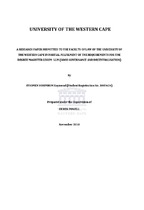| dc.contributor.advisor | Powell, Derek | |
| dc.contributor.author | Eyiomen, Raymond Yosimbom | |
| dc.contributor.other | | |
| dc.contributor.other | Faculty of Law | |
| dc.date.accessioned | 2013-06-21T11:48:52Z | |
| dc.date.available | 2013/02/15 14:30 | |
| dc.date.available | 2013/02/15 | |
| dc.date.available | 2013-06-21T11:48:52Z | |
| dc.date.issued | 2010 | |
| dc.identifier.uri | http://hdl.handle.net/11394/1560 | |
| dc.description | Magister Legum - LLM | en_US |
| dc.description.abstract | Governing an ethnically diverse country constitutes a major challenge for state power and government in Cameroon. The call for national unity, championed by the regime in power has had to survive strong demands for greater autonomy and threats of secession by groups from within an English-speaking minority. In response to these demands and threats, and in conjunction with reforms to improve democratic governance and service delivery, Cameroon state administration has in the last decade resorted to decentralization as a technique for promoting national unity. The question this paper seeks to answer is whether decentralization is helpful or harmful to Cameroon national unity. This study traces the historical, constitutional and political development of the concepts of national unity and decentralization and critically examines their application in the Cameroonian context. It further tests the consolidation of national unity in Cameroon against a theoretical and empirical framework of decentralization. A one-dimensional view of the findings of this study is not very encouraging to regimes seeking to enhance national unity through the implementation of decentralization. However, the major conclusion of this study holds the position that the political outcome of decentralization on Cameroon national unity is largely a product of the constitutional regulation of both concepts and the manner in which the theoretical dimensions of decentralization are transplanted onto Cameroon political landscape. The paper recommends certain reforms to assist and guide Cameroon as it simultaneously implements decentralization and consolidates national unity. | en_US |
| dc.language.iso | en | en_US |
| dc.publisher | University of the Western Cape | en_US |
| dc.subject | National unity | en_US |
| dc.subject | Decentralization | en_US |
| dc.subject | Diversity | en_US |
| dc.subject | Regions | en_US |
| dc.subject | Local authorities | en_US |
| dc.subject | Autonomy | en_US |
| dc.subject | Secession | en_US |
| dc.subject | Good governance | en_US |
| dc.subject | Cameroon | en_US |
| dc.title | Breaking to build: decentralization as an efficient mechanism for achieving national unity in Cameroon | en_US |
| dc.type | Thesis | en_US |
| dc.rights.holder | University of the Western Cape | en_US |
| dc.description.country | South Africa | |

